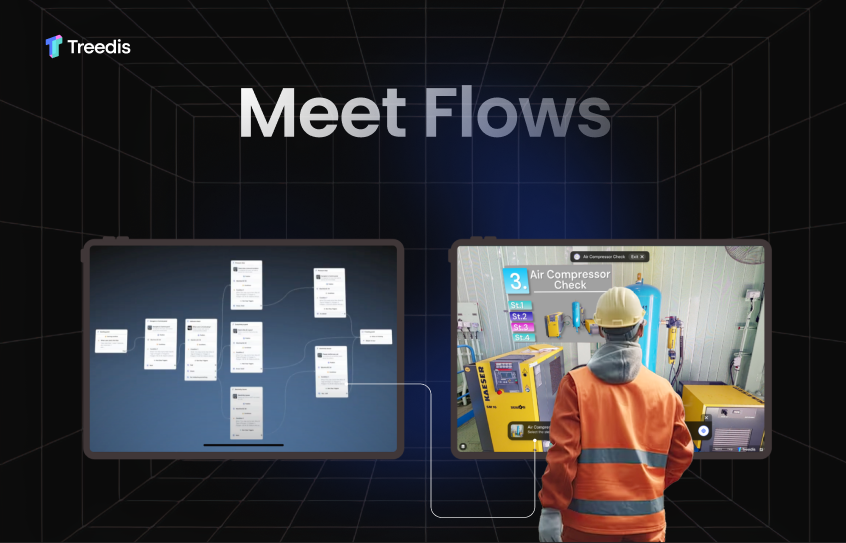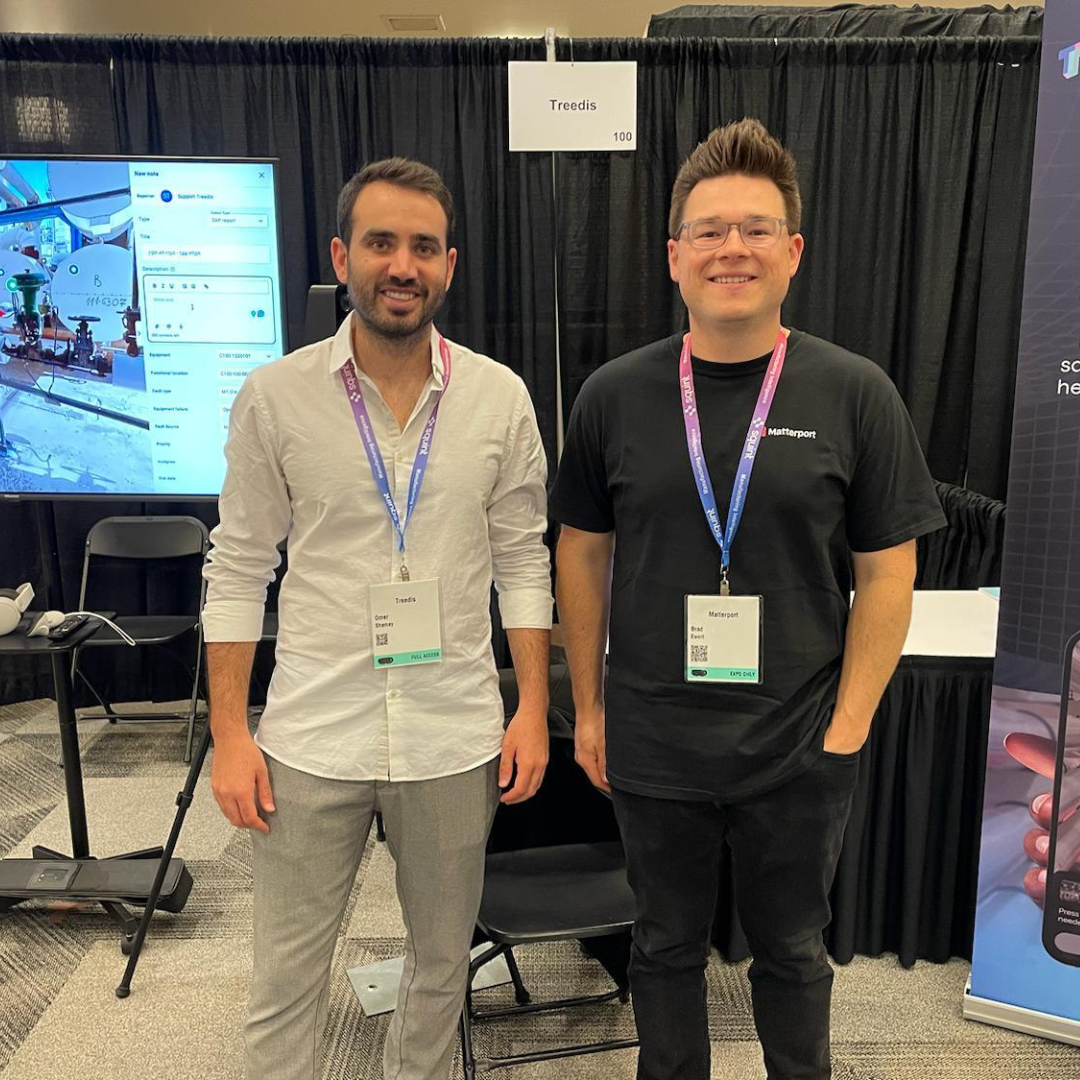May 30, 2025
Blog
The 7 Industry 4.0 Technologies Revolutionizing Frontline Work in Manufacturing
.png)
.jpg)

Introduction
.png)
A technological revolution is reshaping the very essence of manufacturing and business processes in the ever-evolving landscape of modern industry, enabled by Industry 4.0 technologies. As part of this transformation, frontline workers, the backbone of production, face a seismic shift in their roles and responsibilities. Industry 4.0 technologies are empowering frontline workers like never before, propelling productivity, enhancing safety, and fostering innovation.
According to a report by PwC, 72% of manufacturing companies expect to achieve advanced levels of digitization by 2023, up from 33% in 2018. This indicates the growing adoption of Industry 4.0 technologies in the manufacturing sector.
This article explores seven cutting-edge Industry 4.0 technologies that are driving a revolution in the realm of frontline work in manufacturing.
1. Augmented Reality (AR): Precision Amplified

At the forefront of Industry 4.0 technologies lies augmented reality (AR). Imagine frontline workers receiving real-time visual cues that guide them through intricate assembly processes. These devices blur the line between the physical and digital worlds, between remote and in-field, enhancing precision and reducing errors. AR equips frontline workers to perform tasks with unparalleled accuracy, accelerating productivity and quality. Workers can view step-by-step instructions, annotations, and interactive overlays, ensuring that every action aligns with the highest standards.
A study by ABI Research found that AR-based training and guidance solutions can reduce the time required for frontline workers to become proficient by up to 50%, while also improving quality and safety outcomes.
2. Virtual Reality (VR)

Virtual reality (VR) emerges as a pivotal tool in the Industry 4.0 technologies arsenal, particularly in training and safety. VR simulations enable frontline workers to immerse themselves in realistic scenarios within controlled environments. This transformative approach allows workers to experience and respond to hazardous situations, building muscle memory and decision-making skills. By practicing in virtual environments, workers are better prepared to navigate real-world challenges safely. VR not only enhances training but also fosters a culture of proactive safety measures, minimizing risks and preventing injuries.
3. Internet of Things (IoT)

The Internet of Things (IoT) is a cornerstone of Industry 4.0 technologies, revolutionizing frontline workers' interactions with their environment. IoT technology connects devices and sensors, generating real-time data streams. This data empowers frontline workers with insights into equipment performance, health, and potential hazards. Workers can monitor machines remotely, receive alerts for maintenance needs, and respond swiftly to prevent downtime. IoT transforms the workplace into a smarter, safer environment, where informed decisions are made based on actionable data, reducing disruptions and ensuring operational efficiency.
A survey by Microsoft revealed that 94% of manufacturing leaders believe that IoT is critical for their business success, and 87% plan to increase their IoT investments over the next two years.
4. Digital Twins

Central to the Industry 4.0 technologies landscape is the concept of digital twins. These digital replicas mirror real-world assets in the virtual realm, offering frontline workers unprecedented insights into equipment behavior and performance. This trove of information becomes the bedrock of informed decision-making. Vital information and content, such as instructions, floorplans, safety protocols, ID's, and more, are seamlessly accessible within the digital twin environment.
A research by Gartner predicted that by 2021, half of large industrial companies will use digital twins, resulting in a 10% improvement in effectiveness.
5. Collaborative technologies

Using Industry 4.0 technologies, frontline employees can collaborate seamlessly and share knowledge. Experts can assist field technicians in real time with complex tasks using advanced collaboration tools like remote augmented reality (AR), virtual reality (VR), and virtual meetings. IoT data integration and augmented reality overlays make workers more productive. Using AR and VR, SOPs can be digitalized, and safety guidelines, compliance protocols, and step-by-step instructions can be provided.
The real-time interaction means workers can access the expertise and support they need, no matter where they are. Collaboration technologies revolutionize training, problem-solving, and decision-making, creating a culture of continuous improvement.
According to a report by Accenture, collaborative technologies can increase productivity by up to 30 percent and reduce defects by up to 50 percent in manufacturing operations.
6. Artificial Intelligence (AI)
Among the Industry 4.0 technologies, artificial intelligence and machine learning stand out as transformative elements. By processing massive amounts of data, AI algorithms provide frontline workers with predictive maintenance insights into the performance of equipment and potential problems.. During maintenance workflows , it can analyze employees' actions and provide real-time feedback, ensuring that they are following the correct procedures as they occur. In the future, AI will become more integrated with other Industry 4.0 technologies, enhancing productivity, efficiency, and foresight on the frontline.
7. All-in-One Platform with Treedis: Streamlining Frontline Empowerment
.gif)
Amidst the array of Industry 4.0 technologies, Treedis stands as a comprehensive all-in-one platform. Treedis is a no-code platform that transforms industrial teams into connected workers to increase efficiency and reduce downtime.Treedis empowers frontline workers by seamlessly integrating the capabilities of augmented reality, virtual reality, digital twins, IoT and collaborative tools (hub). Treedis' intuitive nature ensures that technical expertise is not a barrier, enabling workers to upskill with ease.
Treedis not only empowers individuals but also unifies the potential of Industry 4.0 technologies in one easy to use solution, driving frontline work towards unprecedented levels of productivity, efficiency, and innovation.
Conclusion: Unleashing the Potential of Industry 4.0 technologies or Frontline Workers
Industry 4.0 technologies are reshaping frontline workers' roles and abilities in a rapidly evolving manufacturing landscape. A number of technologies are leading this transformation, including augmented reality, virtual reality, digital twins, IoT, collaborative tools, AI, and Treedis. With these technologies, workers can navigate Industry 4.0 with confidence, amplify precision, enhance safety, and cultivate collaboration. By harnessing these technologies, frontline workers will be able to achieve unprecedented productivity and innovation in manufacturing.
More Articles
More Articles



May 30, 2025
Future-Proofing Operations with Flows
Want your team to train better? We have your solution. This blog breaks down our standout feature, Flows, showing it's potential for your organisation.
.png)

Jan 14, 2025
How Immersive Technologies Are Revolutionizing Workforce Training and Closing the Skills Gap
Immersive technologies like AR, VR, and digital twins are revolutionizing workforce training by addressing the growing skills gap with engaging, hands-on learning experiences. These solutions enhance retention, boost productivity, and reduce costs, making them essential for dynamic, scalable training in a rapidly evolving job market.


Nov 27, 2024
What's Next For Training? Takeaways From The Augmented Enterprise Summit
In October, we joined the Augmented Enterprise Summit (AES) with Matterport, connecting with industry leaders and Fortune 500 companies while sharing key XR insights.


Jun 28, 2024
Digital Twin Awards: Success Stories
The Digital Twin Awards honor virtual tour innovation. This year, Treedis users Farhad Berahman from Limina Studios and Francesco Loddo from SardiniaVirtualTours3D won in historical and hospitality categories. Farhad's tour of AlUla captivated 2 million viewers, while Francesco's tour of Maiori Villasimius boosted bookings by 25%. Their achievements showcase the transformative power of Treedis technology.
%20(1).jpg)

Jun 5, 2024
Key Insights from Hannover Messe: The Future of Manufacturing in Industry 4.0
At the 2024 Hannover Messe, Treedis showcased its Connected Workers solution with AWS, Vodafone Business, and Matterport, integrating digital twins and live sensor data to enhance manufacturing efficiency. This collaboration highlighted the importance of strategic partnerships in advancing Industry 4.0. Treedis remains committed to providing scalable, innovative solutions for the evolving manufacturing landscape.


.jpg)
.png)











